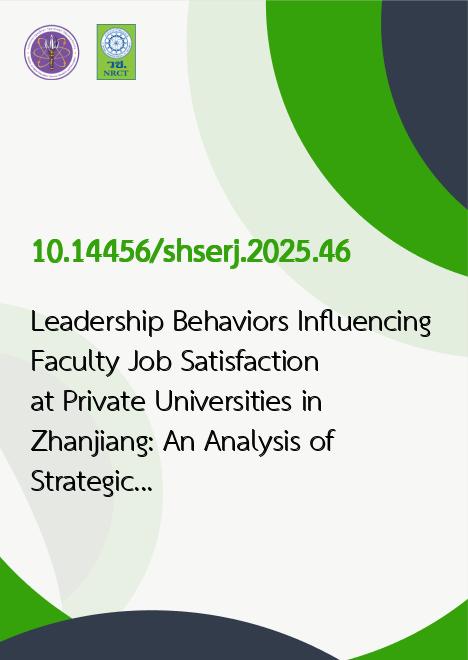
|
Leadership Behaviors Influencing Faculty Job Satisfaction at Private Universities in Zhanjiang: An Analysis of Strategic Interventions |
|---|---|
| รหัสดีโอไอ | |
| Creator | Shu Chen |
| Title | Leadership Behaviors Influencing Faculty Job Satisfaction at Private Universities in Zhanjiang: An Analysis of Strategic Interventions |
| Publisher | Assumption University Press |
| Publication Year | 2568 |
| Journal Title | The Scholar: Human Sciences |
| Journal Vol. | 17 |
| Journal No. | 2 |
| Page no. | 168-178 |
| Keyword | Leadership Behaviors, Job Satisfaction, Leader-Member Exchange, Inspirational Motivation, Intellectual Stimulation |
| URL Website | https://assumptionjournal.au.edu/index.php/Scholar/article/view/8006 |
| Website title | https://assumptionjournal.au.edu/index.php/Scholar |
| ISSN | 2586-9388 |
| Abstract | Purpose: This research investigates the impact of leadership behaviors on faculty job satisfaction in private universities in Zhanjiang, China, focusing on leader-member exchange, inspirational motivation, intellectual stimulation, and performance management participation. Research design, data, and methodology: Utilizing a mixed-methods approach, the study combines qualitative interviews and observations with quantitative data collected through surveys from 86 faculty members across three departments. The reliability and validity of the survey were established using the Instrument of Organization Culture and Cronbach's alpha. A multiple linear regression analysis validated the significant relationships between leadership behaviors and job satisfaction. A strategic intervention was then applied to a targeted group of 30 teachers over 16 weeks, with the effectiveness assessed through paired-sample t-tests comparing pre- and post-intervention data. Results: The results demonstrated significant positive impacts of leader-member exchange, inspirational motivation, intellectual stimulation, and performance management participation on faculty job satisfaction. The intervention results further validated these findings, showing marked improvements in job satisfaction scores post-intervention across all measured leadership behaviors. Conclusions: The insights underscore the importance of strategic leadership development and participatory management practices in fostering a supportive academic environment and promoting faculty well-being and institutional quality. |
